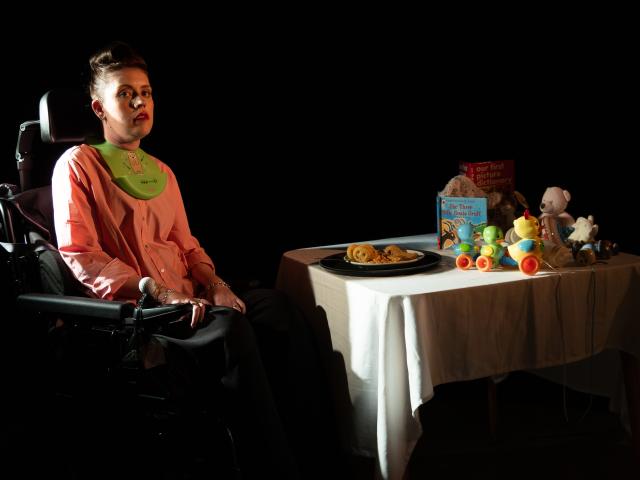
International Day of Women and Girls in Science 2025
11 February
To mark International Day of Women and Girls in Science, we hear from four researchers we have supported about some of their recent work.
From population analysis to podcasts to photo exhibitions, championing disengaged voices and centralising lived experiences, their stories show the diversity of studies that we are proud to support to improve people’s and patients’ lives across Wales.
Capturing the voices of young care leavers
Dr Ceryl Teleri Davies is a Lecturer in Health Sciences and Social Work at Bangor University and a member of the Health and Care Research Wales Faculty. She draws on her professional experience as a social worker to inform her research, including her recent study which explored why young adults from across Wales may disengage with support services once they leave care. The study included a podcast, Care Matters, featuring young care leavers themselves.
The study aimed to understand why young people disengaged from support, using these findings to develop a toolkit to engage with care leavers in a more effective way.
Dr Davies said: “Voices of some citizens, often unheard tend to be missing from research, which made this study an exciting opportunity to understand what really matters to care leavers, in order to develop a more effective system for future generations.”
Evocative exhibition co-designed by neuro care residents
Dr Julie Latchem-Hastings is a Senior Lecturer at Cardiff University’s School of Healthcare Sciences. Her current study, FEAST (Feeding, Eating and Drinking in Neurological Care: Sharing Practice to Transform Care), explores the role food plays in the care experience in long-term neurological care settings. Food quality and mealtime experience has long been presented as unsatisfactory, whilst being identified by residents as central to their quality of life.
The study conducted interviews with long-term neuro care residents and staff exploring mealtime experience and how food could be used to enhance wellbeing. Workshops were held with residents who designed a “Harvest Festival” feast, delivered by catering staff and enjoyed by residents, staff and family members. Most recently, it staged an exhibition of photos demonstrating the study’s key findings about supported eating, codesigned by residents and staff. The exhibition generated significant interest from academic colleagues, research funders and NHS contacts, with further exhibitions planned this year.
Opening the door to research among Gypsy and Traveller communities
Sarah Parry is a first-time researcher whose study explored the barriers and facilitators to breastfeeding for Gypsy and Traveller mothers, communities she has worked with extensively as a Health Visitor at Cwm Taf Morgannwg University Health Board.
Around 80% of UK mothers initiate breastfeeding, compared to 63% in Wales, but only 3% of Gypsy and Traveller mothers. Through interviews discussing their feelings and concerns around breastfeeding, common themes began to emerge. Greater understanding of barriers and facilitators may enable health professionals to develop appropriate breastfeeding promotion initiatives, as well as impact the design of Gypsy and Traveller sites.
Sarah said: “My first research study has had a profound impact on me, igniting a real passion for research. Since completing the study, further women asked if they could participate, so it may open the doors for further research in the future.”
Rethinking multimorbidity to improve patient care
Professor Rhiannon Owen is Professor of Statistics at Swansea University Medical School and a member of the Health and Care Research Wales Faculty. Her current study, Rethinking Health Policy in Multimorbidity (REMIT), aims to develop new methods to assess treatments for people living with multiple long-term conditions.
It will look at how diseases accumulate in patients over time, their impact, and whether patients’ socioeconomic backgrounds influence multimorbidity, as well as whether it is possible to identify opportunities to screen for and prevent it. This aims to help decision-makers use resources more effectively and improve patient care.
Professor Owen said, “As global populations are ageing, there are increasing numbers of people living with multiple long-term conditions, which poses a major health concern worldwide. Targeted approaches for the management of multiple long-term conditions are a crucial component for healthcare planning both now and into the future.”
For more research stories delivered to your inbox, sign up to the bulletin.